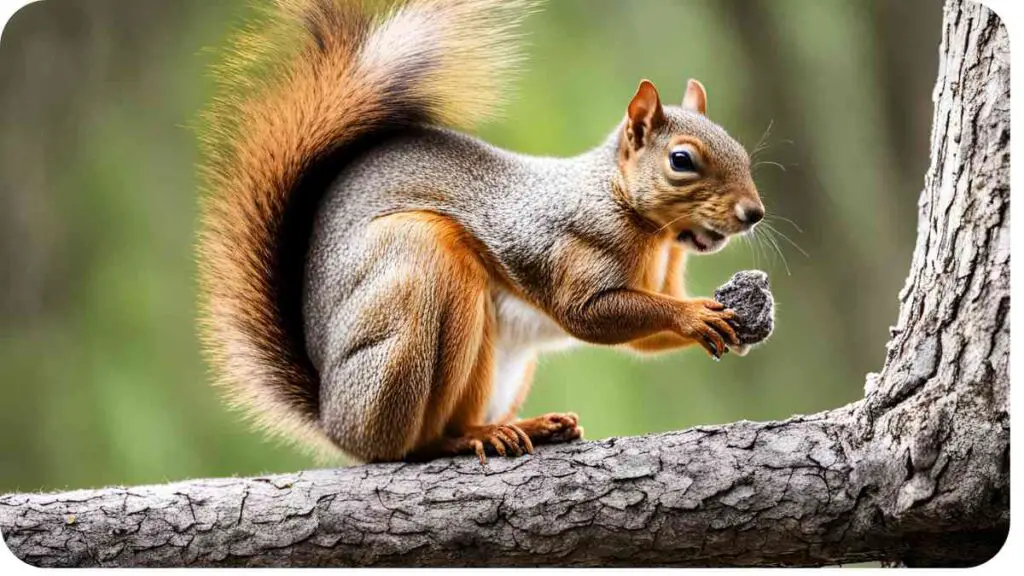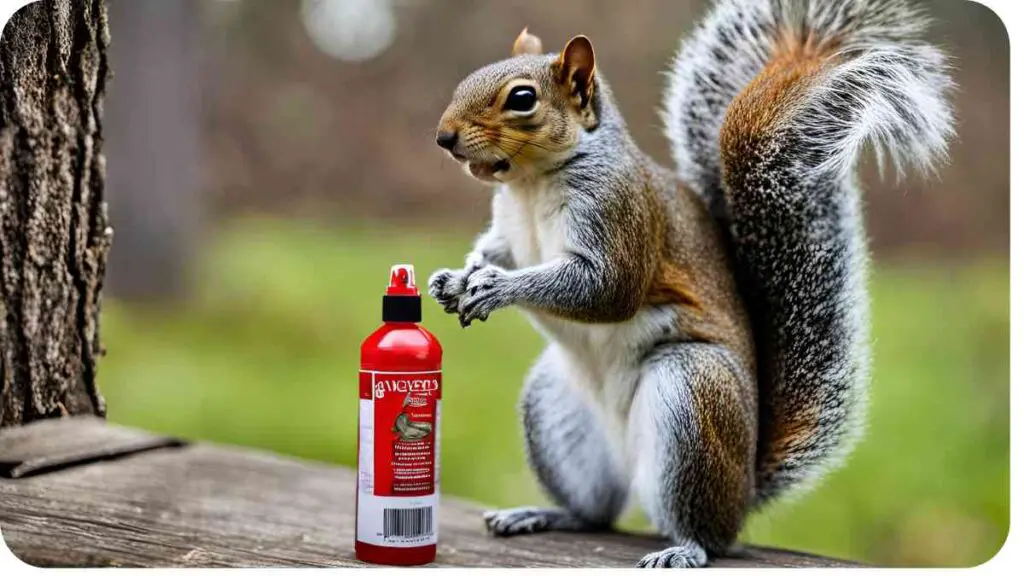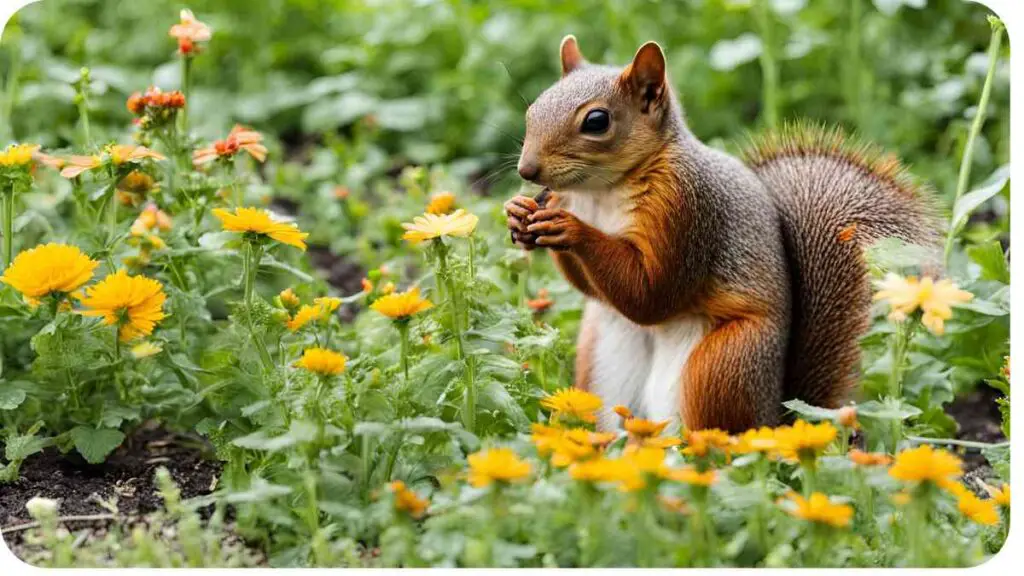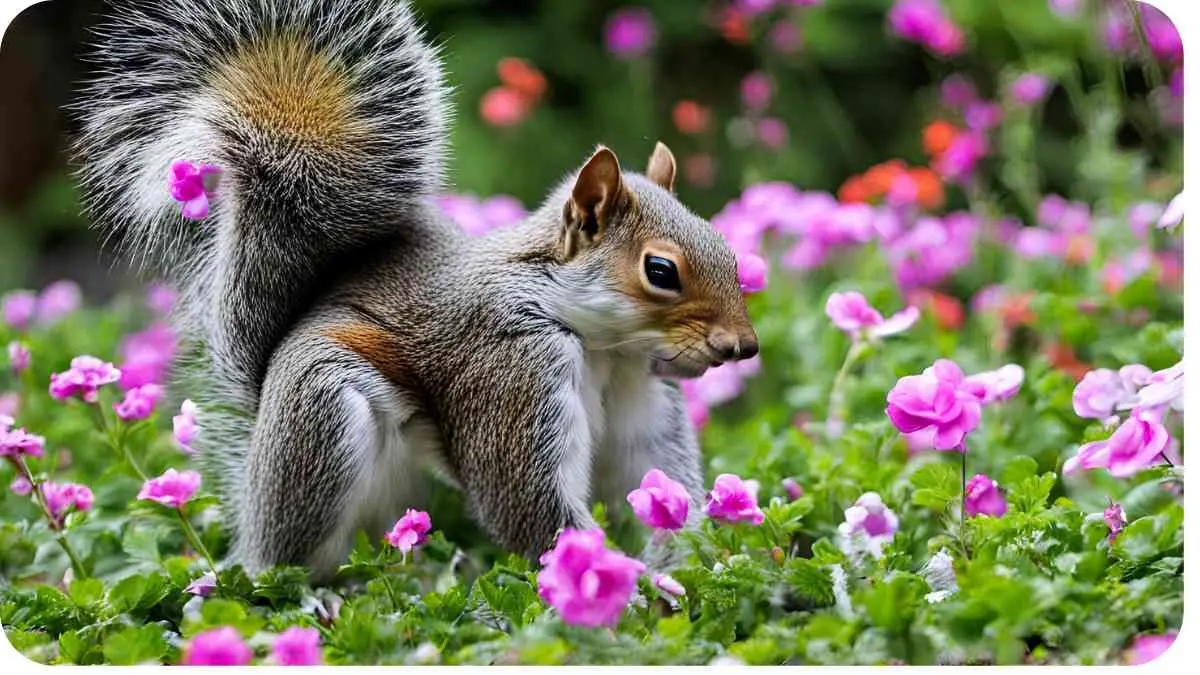Squirrels are adorable creatures when they’re frolicking in the park, but when they invade your flower garden, they can become a nuisance. In this comprehensive guide, we’ll explore effective strategies to get rid of squirrels from your precious flower beds without harming them.
| Key Takeaways |
|---|
| 1. Understanding squirrel behavior is crucial for effective deterrence. |
| 2. Implement natural repellents like hot pepper spray or predator urine. |
| 3. Explore DIY methods such as tin foil strips or motion-activated sprinklers. |
| 4. Consider using commercial products like liquid sprays or electronic repellents. |
| 5. Maintain garden hygiene to discourage squirrels from frequenting your garden. |
| 6. In persistent cases, seek professional pest control services for comprehensive solutions. |
2. Understanding Squirrel Behavior

Before diving into eradication methods, it’s crucial to understand squirrel behavior. These agile rodents are attracted to gardens for food, shelter, and nesting sites. They’re active during the day and are notorious for digging up bulbs, munching on tender shoots, and even nibbling on flowers.
To deter feline intruders, implement humane methods like keeping cats out with barriers and repellents. Creating an unwelcoming environment discourages them from using your flower garden as a litter box.
| Behavior | Description |
|---|---|
| Feeding Habits | Squirrels are omnivores and have a voracious appetite for nuts, seeds, and fruits. They’ll also devour tender plants in your garden. |
| Nesting Sites | Squirrels seek cozy nesting spots, often choosing gardens with dense vegetation and ample hiding places. |
| Activity | These critters are most active during the day, especially in the early morning and late afternoon. |
3. Signs of Squirrel Presence in Your Garden
Spotting squirrels in your garden is one thing, but sometimes they can be sneaky and elusive. Here are some signs to look out for:
| Sign | Description |
|---|---|
| Nibbled Plants | If you notice flowers or vegetables with missing petals or partially eaten leaves, squirrels might be the culprits. |
| Dug-up Soil | Squirrels love to bury their nuts and may dig up freshly planted bulbs or disturb the soil in search of food. |
| Squirrel Droppings | Their droppings resemble small, cylindrical pellets and are often found near feeding areas or along fence lines. |
| Gnaw Marks | Check for chew marks on bird feeders, wooden structures, or even plastic containers. Squirrels have strong teeth and love to gnaw on various materials. |
4. Common Squirrel Damage to Flower Gardens
Squirrels can wreak havoc in your flower garden, causing damage that ranges from mild to severe. Here’s a breakdown of the typical havoc they wreak:
| Type of Damage | Description |
|---|---|
| Plant Destruction | Squirrels may uproot young plants, gnaw on stems, or strip bark from trees. This can stunt growth or even kill your beloved flowers. |
| Bulb Raiding | Spring-flowering bulbs like tulips and crocuses are irresistible to squirrels, who’ll eagerly dig them up in search of a tasty snack. |
| Seed Consumption | If you’re growing fruits or vegetables, squirrels may raid your garden beds and munch on seeds, leading to reduced yields and frustration for gardeners. |
| Nesting Damage | Squirrels might build nests in trees or shrubs, causing damage to branches and foliage. Their nests can also attract other pests and pose a fire hazard. |
5. Natural Squirrel Repellents

When it comes to deterring squirrels from your flower garden, sometimes the best solutions are the ones provided by nature itself. Here are some natural repellents you can use:
When faced with a rodent invasion in your outdoor space, learn effective strategies for eliminating rats from your flower beds. Combining traps, deterrents, and proper sanitation can help mitigate this pest problem swiftly and efficiently.
| Natural Repellent | Description |
|---|---|
| Hot Pepper Spray | Create a homemade spray using hot peppers, garlic, and water. The spicy scent and taste deter squirrels from feasting on plants. |
| Predator Urine | Predator urine, such as that from foxes or coyotes, can instill fear in squirrels, convincing them to stay away from your garden. |
| Blood Meal | Sprinkling blood meal around your garden beds emits an odor that squirrels find unpleasant, deterring them from digging. |
| Mothballs | The strong odor of mothballs can repel squirrels, but use caution as they can be toxic to other wildlife and pets. |
These natural remedies offer a humane and eco-friendly way to protect your flower garden from squirrel damage. However, if you prefer a more hands-on approach, DIY squirrel deterrents might be the solution for you.
6. DIY Squirrel Deterrents
DIY squirrel deterrents are affordable, easy to make, and can be highly effective in keeping these furry pests at bay. Here are some DIY solutions to try:
| DIY Deterrent | Description |
|---|---|
| Tin Foil Strips | Hang strips of aluminum foil or pie pans in your garden. The reflective surface and noise they make in the wind can scare squirrels away. |
| Ultrasonic Devices | Install ultrasonic repellent devices that emit high-frequency sound waves, which are unpleasant for squirrels but harmless to humans and pets. |
| Scented Repellents | Squirrels have a keen sense of smell, so placing strong-smelling items like citrus peels or mint leaves around your garden can deter them. |
| Motion-Activated Sprinklers | These devices spray water when they detect motion, startling squirrels and convincing them to stay away from your garden. |
DIY squirrel deterrents are a budget-friendly option for gardeners looking to protect their flower beds from squirrel damage. However, if you prefer ready-made solutions, there are plenty of commercial squirrel repellent products available.
7. Commercial Squirrel Repellent Products
Commercial squirrel repellents offer convenience and reliability, providing effective solutions for keeping squirrels out of your flower garden. Here are some popular products to consider:
| Repellent Product | Description |
|---|---|
| Liquid Repellents | Sprays or concentrates that you can apply directly to plants or garden surfaces. They often contain natural ingredients like capsaicin or predator urine. |
| Granular Repellents | Granules that you can spread around your garden beds to create a barrier against squirrels. They typically contain ingredients like garlic or dried blood. |
| Electronic Repellents | Devices that emit ultrasonic sound waves or flashing lights to deter squirrels without harming them. They’re easy to install and require minimal maintenance. |
| Squirrel-Proof Bird Feeders | Specialized bird feeders designed with mechanisms to prevent squirrels from accessing bird food. They’re a great way to redirect squirrels’ attention away from your garden. |
These commercial products offer a convenient and effective way to protect your flower garden from squirrel damage. However, if you prefer a more hands-on approach, trapping squirrels humanely might be the solution for you.
Maintain the beauty of your flower beds by employing the appropriate weed killer for targeted weed control. Selecting the right product and application method ensures effective weed management without harming your precious blooms.
8. Trapping Squirrels Humanely
Trapping squirrels humanely allows you to remove them from your garden without causing harm. Here’s how to do it safely and effectively:
| Humane Trapping Tips | Description |
|---|---|
| Choose the Right Trap | Select a live trap specifically designed for squirrels. These traps capture squirrels without injuring them, allowing for safe relocation. |
| Bait Appropriately | Use bait like peanut butter or nuts to lure squirrels into the trap. Place the trap along known squirrel pathways or near feeding areas. |
| Check Traps Regularly | Check the traps frequently, ideally every few hours, to ensure captured squirrels are promptly released or relocated. |
| Release Safely | Once captured, release squirrels in a suitable location away from your property. Ensure the release site provides food, water, and shelter. |
Humane trapping is a compassionate way to deal with squirrel intrusions while minimizing harm to these animals. However, if trapping isn’t feasible or preferred, creating physical barriers in your garden might be the solution for you.
9. Creating Physical Barriers
Physical barriers can be highly effective in preventing squirrels from accessing your flower garden. Here are some barrier options to consider:
| Barrier Type | Description |
|---|---|
| Chicken Wire | Install chicken wire fencing around garden beds or individual plants to prevent squirrels from digging or climbing. |
| Hardware Cloth | Similar to chicken wire but with smaller mesh sizes, hardware cloth provides extra protection against smaller rodents. |
| Collars and Cages | Place protective collars or cages around vulnerable plants to shield them from squirrel damage. |
| Netting | Covering your entire garden or specific plants with netting can prevent squirrels from reaching their targets. |
These physical barriers offer a proactive approach to squirrel deterrence, ensuring your flower garden remains untouched and flourishing. Additionally, companion planting can complement your barrier strategy.
10. Companion Planting to Deter Squirrels

Companion planting involves strategically placing certain plants to repel pests and attract beneficial insects. Here are some companion plants that can help deter squirrels:
| Companion Plant | Description |
|---|---|
| Daffodils | Squirrels tend to avoid daffodils due to their toxic bulbs, making them an excellent deterrent when planted among other flowers. |
| Marigolds | The strong scent of marigolds can mask the aroma of other plants, making them less attractive to squirrels. |
| Alliums | Plants like garlic, onions, and chives contain compounds that squirrels find unappealing, deterring them from nearby areas. |
Incorporating these companion plants into your flower garden not only adds visual interest but also serves as a natural squirrel deterrent. However, if squirrels persist despite your efforts, it may be time to squirrel-proof your garden structures.
Prepare your flower beds for the blooming season with a thorough spring cleaning. Remove debris, trim plants, and rejuvenate the soil to create an optimal environment for healthy growth and vibrant flowers.
11. Squirrel-Proofing Your Garden Structures
Squirrels are adept climbers and jumpers, so it’s essential to squirrel-proof your garden structures to prevent access. Here are some tips to squirrel-proof common garden structures:
| Garden Structure | Squirrel-Proofing Tips |
|---|---|
| Bird Feeders | Install baffles or squirrel guards on bird feeder poles to prevent squirrels from accessing bird seed. |
| Trees and Shrubs | Trim tree branches and shrubs away from buildings and fences to limit squirrel access to your garden. |
| Trellises and Fences | Place metal collars around trellises or fences to prevent squirrels from climbing. Alternatively, use smooth materials that are difficult for squirrels to grip. |
By squirrel-proofing your garden structures, you can create a fortress that’s off-limits to these furry intruders. However, maintaining garden hygiene is equally important in keeping squirrels at bay.
12. Maintaining Garden Hygiene
Keeping your garden clean and well-maintained is essential for deterring squirrels and preventing potential infestations. Here are some hygiene practices to incorporate into your gardening routine:
| Garden Hygiene Practice | Description |
|---|---|
| Remove Fallen Fruit | Pick up fallen fruits regularly to prevent them from attracting squirrels. Dispose of them in sealed containers or compost bins. |
| Clean Bird Feeders | Regularly clean bird feeders and remove spilled seeds to discourage squirrels from visiting your garden for an easy meal. |
| Seal Trash Bins | Ensure trash bins are tightly sealed to prevent squirrels from scavenging for food scraps. Consider using squirrel-proof lids. |
| Prune Overgrown Vegetation | Trim overgrown vegetation to eliminate hiding spots and reduce the attractiveness of your garden to squirrels. |
Maintaining good garden hygiene not only deters squirrels but also promotes a healthy and thriving garden ecosystem. However, if squirrels persist despite your efforts, seeking professional pest control services may be necessary.
13. Professional Pest Control Services
If you’ve tried various DIY methods and still can’t seem to get rid of squirrels in your flower garden, it may be time to enlist the help of professional pest control services. Here’s what you can expect from professional pest control:
Protect your flower beds from unwanted feline visitors by implementing effective cat deterrents. From natural repellents to physical barriers, explore various methods to safeguard your garden and maintain its beauty.
| Professional Services | Description |
|---|---|
| Inspection | Pest control professionals will conduct a thorough inspection of your property to assess the extent of the squirrel infestation. |
| Customized Solutions | Based on their findings, they’ll develop a customized treatment plan tailored to your specific situation and garden needs. |
| Safe and Effective Methods | Pest control experts use safe and humane methods to remove squirrels from your property while minimizing harm to the animals. |
| Follow-up Maintenance | After treatment, they may provide follow-up visits to ensure the squirrel problem is fully resolved and offer preventive measures. |
14. Conclusion
In conclusion, tackling the issue of squirrels invading your flower garden requires a multifaceted approach that combines understanding their behavior, implementing deterrents, and maintaining garden hygiene. By recognizing the signs of squirrel presence and understanding the extent of their damage, you can tailor your strategies accordingly.
Natural repellents, DIY deterrents, and commercial products offer effective solutions for deterring squirrels without causing harm. Additionally, humane trapping and physical barriers provide alternative methods for managing squirrel populations in your garden.
Companion planting and squirrel-proofing garden structures offer further layers of defense, while maintaining garden hygiene prevents attracting squirrels in the first place. In cases where DIY methods fall short, seeking professional pest control services ensures thorough and long-term solutions.
Further Reading
- Epic Gardening: Squirrels in the Garden: Offers comprehensive insights into dealing with squirrels in the garden, including identification, prevention, and deterrent methods.
- Garden Design: How to Deal with Squirrels: Provides practical advice on managing squirrel issues in the garden, covering topics such as natural repellents and protecting bird feeders.
- MasterClass: Tips to Keep Squirrels Out of Your Garden: Offers expert tips and techniques for keeping squirrels at bay, including strategies for humane trapping and creating physical barriers.
FAQs
How can I identify if squirrels are present in my garden?
Squirrels leave behind distinctive signs such as nibbled plants, dug-up soil, droppings, and gnaw marks on garden structures.
What are some natural squirrel repellents I can use?
Hot pepper spray, predator urine, blood meal, and mothballs are effective natural repellents that deter squirrels from your garden.
What DIY methods can I try to deter squirrels?
DIY deterrents such as tin foil strips, ultrasonic devices, scented repellents, and motion-activated sprinklers can help keep squirrels away from your garden.
Are there commercial products available to repel squirrels?
Yes, there are various commercial repellent products including liquid sprays, granular repellents, electronic devices, and squirrel-proof bird feeders.
How can I squirrel-proof my garden structures?
You can squirrel-proof your garden structures by installing baffles or guards on bird feeders, trimming tree branches, and using smooth materials for trellises and fences.

For 15 years, Hellen James has worked in the gardening industry as an expert and landscape designer. During her career, she has worked for a variety of businesses that specialize in landscaping and gardening from small firms to large corporations.

